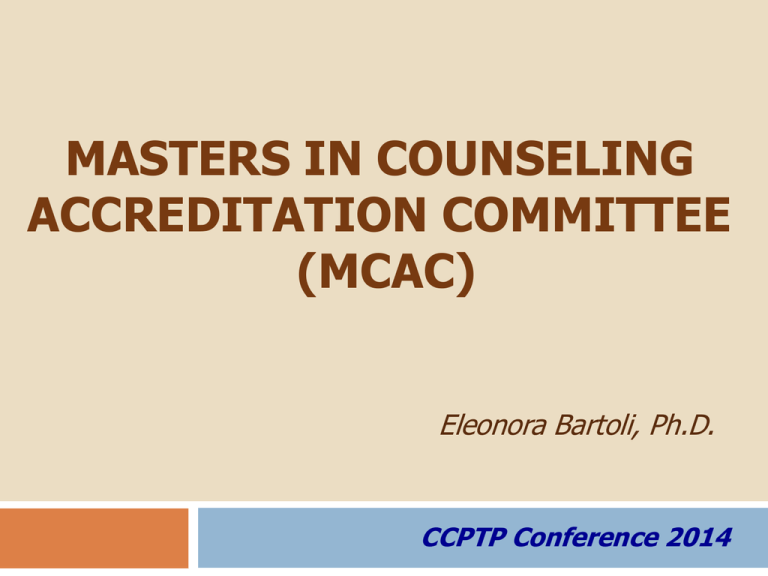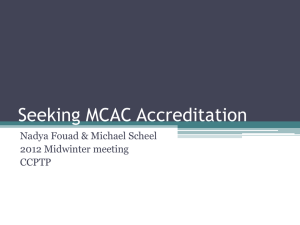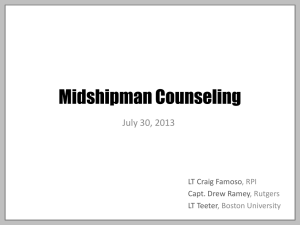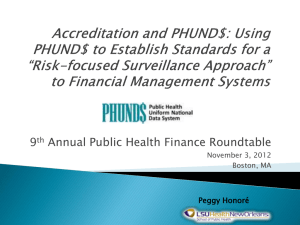MDAC Presentation (Bartoli) - Council of Counseling Psychology
advertisement

MASTERS IN COUNSELING ACCREDITATION COMMITTEE (MCAC) Eleonora Bartoli, Ph.D. CCPTP Conference 2014 Agenda 2 • Introduction to MCAC • The need for an alternative accrediting body • MCAC training standards • MCAC application process • Q&A MPCAC organizational structure 3 In process of applying for CHEA MPCAC Masters in Psychology and Counseling Accreditation Council MCAC Masters in Counseling Accreditation Committee MPAC Masters in Psychology Accreditation Committee How is MCAC different? 4 MCAC Meets The Diverse Needs of Today’s Counseling Programs Connects faculty across disciplines Emphasizes cultural competency Focuses on human development across the life-span Believes in strength-based helping strategies Supports social justice training Who needs MCAC? 5 Universities as well as state licensing boards increasingly value accreditation as a way of ensuring quality training and therefore protection of the public. For many programs interested in accreditation, MCAC provides the opportunity to seek an accreditation that mirror’s their philosophy (as described in the prior slide). MCAC Standard Areas 6 1.Professional Counselor identity, ethical behavior, and social justice practices Including but not limited to: assisting students to acquire knowledge related to the history of the helping profession; professional counseling roles and functions; ethical standards related to professional organizations in the field of counseling; and public policy processes including system advocacy strategies on behalf of the profession, clients, and the communities that counselors serve. MCAC Standard Areas 7 2. Human development and wellness across the life span Including but not limited to: the study of life span development; maturational and structural theories of human development; wellness counseling theories; strategies to deal with developmental processes and transitions; human behavior; disabilities; environmental, contextual and multicultural factors that contribute to healthy human development and relevant culturally competent counseling practices; and the promotion of social justice in society. MCAC Standard Areas 8 3. Neuroscientific, physical, and biological foundations of human development and wellness Including but not limited to: facilitating students’ acquisition of new knowledge related to neuroscience, health and wellness; addictions; and the use of neuroscientific research findings for culturally competent counseling practices and social justice advocacy interventions. MCAC Standard Areas 9 4. Ecological, contextual, multicultural, social justice foundations of human development Including but not limited to: the study of culture from ecological, contextual, multicultural, and social justice perspectives; evidence-based strategies for working with diverse groups (related to but not limited to age, race, culture, ethnicity, disability, sexual orientation, gender, class, religion/spirituality); the impact of power, privilege, and oppression and micro/macro aggressions on human development; and culturally competent counseling and social justice advocacy interventions. MCAC Standard Areas 10 5. Counseling, consultation, and social justice advocacy theories and skills Including but not limited to: training in preventive counseling; consultation; individual, group, couples, marriage, family and addictions counseling; systems change intervention strategies and skills; and social justice advocacy interventions. MCAC Standard Areas 11 6. Group theory, practice, and social justice advocacy Including but not limited to: principles of group dynamics, group process, and group leadership; theories and methods of group counseling; and the application of group work theory and practice to organizational dynamics and social justice advocacy in different environmental settings (e.g., family, school, university, workplace, and community settings). MCAC Standard Areas 12 7. Career and life development Including but not limited to: the study of vocational/career development theories and decision-making models; career assessment instruments and techniques; occupational and related educational systems; career development applications; career counseling processes/techniques; and the application of social justice theories to people’s vocational/career development. MCAC Standard Areas 13 8. Assessment of human behavior and organizational/community/ institutional systems Including but not limited to: assessment and diagnosis of individual psychiatric disorders as defined by classification systems such as the Diagnostic Statistical Manual (DSM) and the International Classification of Diseases (ICD); understanding of defined diagnostic disorders relative to the helping context; knowledge of cultural biases associated with classification systems; assessment strategies designed to promote healthy human functioning; and assessment strategies that focus on organizational/community/social justice advocacy dynamics as they impact human development, wellness, and the perpetuation of psychiatric disorders as listed in various classification systems. MCAC Standard Areas 14 9. Tests and measurements Including but not limited to promoting an understanding of the theoretical and historical basis for, as well as knowledge of cultural biases associated with: assessment techniques; testing methods; knowledge of various types of tests and evaluation strategies that result in knowledgeable selection, administration, interpretation; and use of assessment/evaluation instruments and techniques that foster social justice among diverse client populations. MCAC Standard Areas 15 10. Traditional and social justice-oriented research and evaluations Including but not limited to: quantitative and qualitative research design and methods; statistical analyses, principles, practices, and application of needs assessments; the design and process of program evaluation; organizational, community, and social justice advocacy evaluation strategies; and knowledge of cultural biases associated with research practices. MCAC Standard Areas 16 11. Practicum/Internship experiences At least two (2) academic terms of supervised field placement experiences that focus on issues related to the promotion of mental health, human development, wellness, cultural competence, and social justice advocacy (at least three semester hours or five quarter hours per academic term in a counseling and/or related human service setting with 300 hours of supervised field training). The practicum/internship experience (commensurate with program goals and State licensure requirements) shall be completed under the clinical supervision of appropriately credentialed professionals (e.g., licensed professional counselor, social worker, marriage and family therapist, school counselor, psychologist, or physician with a specialty in psychiatry). MCAC Accreditation Process 17 Application Procedure - Summary Short Pre-application form Self study Site visit (ARC) Review by MCAC with recommendation to MPCAC Final decision by MPCAC Main website: http://www.MPCACaccreditation.org/ MCAC Application Manual (Link) http://www.mpcacaccreditation.org/about/accreditation-manual/ 1. Pre-Application 18 Purpose: MPCAC (through MCAC or MPAC) determines eligibility for accreditation • Key components: • Departmental affiliation appropriate • Program graduates • Assignment to appropriate Committee according to Standards (counseling or psychology) 2. Self-Study 19 Purpose: Applicant program documents appropriate implementation of Standards in curriculum and practices • Key components • Explicit linking of curriculum to Standards • Identification of institutional support • Evidence of program success 3. Appointment of ARC 20 Purpose: MCAC Chair appoints ARC members with approval of site • ARC members review self-study materials and pose substantive questions to site 4. ARC Site Visit and Report 21 Purpose: The site visit provides evidence for the accuracy of the self-study. • Key components: • Site visitors meet with constituents (administrators, faculty, students, graduates, field supervisors, etc.) • Site visitors prepare a report which is reviewed by the site for errors of fact. • Report does not include accreditation recommendation. 5. Review by Committee with Recommendation to MPCAC 22 Purpose: Committee reviews ARC report to determine whether Standards are met and to recommend accreditation (or not) to MPCAC. • • Committee members may raise any concerns If review is positive, Committee members agree on length of accreditation (up to 10 years) 6. Accreditation Decision by MPCAC 23 Purpose: MPCAC makes accreditation decision based on recommendation from Committee. • • MPCAC notifies applicant program of decision. In case of negative decision, an appeal process is outlined in Manual. For more information contact: 24 • • • Patricia O’Connor, Ph.D MPCAC Executive Director oconnp@sage.edu Sabina Widner, Ph.D. MPCAC Chair swidner@gru.edu Eleonora Bartoli, Ph.D. MCAC Chair bartolie@arcadia.edu







